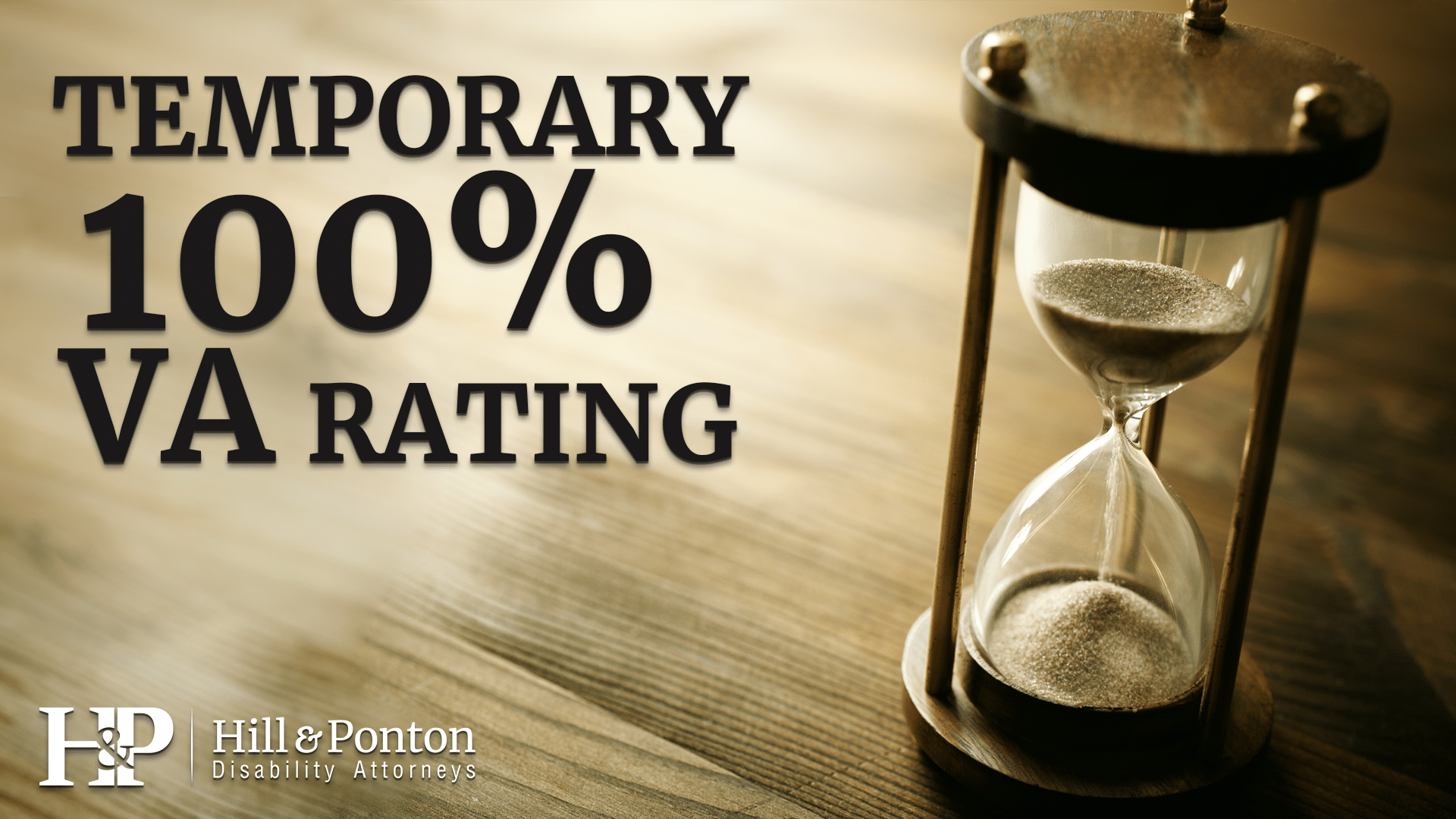There are a few special cases in which the VA will provide a 100% rating for service-connected disabilities that do not otherwise meet the criteria for a 100% VA disability, be it via schedular rating or TDIU. These are situations in which the veteran is hospitalized for a specific length of time due to his/her service-connected disability. This rating is referred to as the temporary 100% rating.
Here are some of the instances when the VA will award temporary total 100% disability ratings.
How long does it take to get temporary 100% VA disability?
The VA is strict about this stipulation and will not give a veteran a “grace period” for almost meeting the 21-day requirement. So a hospital stay of 20 days will not meet the criteria for a temporary 100% rating.
How hard is it to get a temporary 100% VA disability rating?
A 100% rating is available for periods of hospital treatment for a service-connected disability for more than 21 days. Hospitalization can include a number of scenarios, but the important factor is that the hospital treatment must take place in a VA medical center or a VA-approved facility.
For example, if a veteran is taken to the VA hospital for a stroke, but must be transported to a private community hospital due to lack of VA facility beds, the private hospitalization would meet the criteria for this rating, so long as the hospital stay meets the 21-day requirement as well.
Can you get temporary 100% for mental health hospitalization?
Hospital treatment or observation may also include psychiatric hospitalizations. A veteran who has a service-connected mental health disorder, and who has been hospitalized for psychiatric symptoms for the required 21 days or more, is also entitled to a temporary 100% rating. Hospitalization may occur due to suicidal or homicidal ideation, or such exacerbation of symptoms that inpatient care is needed to stabilize the veteran’s condition.
In psychiatric cases, even after the veteran is discharged from hospitalization, he/she can still continue to qualify for the 100% rating, if the veteran immediately enters into a day hospital program following the inpatient hospitalization.
What is temporary total disability VA?
The VA recognizes that admittance into a day hospital indicates that the veteran is still in need of treatment and would not be able to return to employment at that time.
If a veteran is a resident of a nursing home, a State Veteran’s home, domiciliary, or transitional program, he/she does not qualify for hospitalization ratings. There are two exceptions to this rule:
- If the veteran is hospitalized for a service-connected disability in a medical facility located at a State Veteran’s home in excess of 21 days; or
- If a veteran is living in a domiciliary and is receiving treatment that is consistent with hospital care for a service-connected disability.
Temporary 100% VA Disability after Surgery | Convalescence
Convalescence is the act of regaining or returning to a normal or healthy state after surgical operation or injury. A rating of 100% may be temporarily assigned when treatment for a veteran’s service-connected condition(s) requires or results in:
- Surgery necessitating at least 1 month of convalescence
- Immobilization of a service-connected major joint by cast without surgical intervention
- Surgery with severe postoperative residuals, such as:
- Incompletely healed surgical wounds
- Stumps of recent amputations
- Therapeutic immobilization of one or more major joints
- Application of a body cast
- Necessity for home confinement
- Necessity for continued use of wheelchair or crutches
The VA determines how long to extend convalescent pay on a case-by-case basis, as the facts of the case allow. The 100% rating can be extended to 6 months or longer, but the extension has to be approved by a Veterans Service Center Manager.
VA convalescence back pay
When determining the effective dates of the award of 100% for hospitalization, the VA assigns the effective date as the date of entry into the hospital and ends the award on the last day of the month following termination of hospitalization.
Temporary 100% VA disability for Knee replacement
However, the VA’s rating schedule does provide some conditions and surgical procedures that automatically have built-in periods of convalescence. For example, joint replacement with a prosthesis (such as for knees, shoulders, hips, etc) automatically include one year of convalescence.
You will need medical evidence to establish that you need a convalescence rating. It is enough for your doctor to say that you cannot return to work. You will want to ask your doctor to specify in the discharge report whether convalescence is needed and the length of time that will be needed.
How hard is to get a 100% VA disability rating?
A veteran may be assigned a 100% rating if:
- They suffer from an unstabilized condition,
- That condition was incurred in service,
- The condition resulted in severe disability, and
- That condition makes substantially gainful employment not feasible or advisable
Some examples might be:
- If you had a car accident in service and suffered a head injury, and have residuals from that head injury
- If you were in combat during service and suffered gunshot wounds and now have residuals from those wounds
If you are entitled to a 100% rating for these conditions or individual unemployability, then you will not be assigned a prestabilization rating. Prestabilization ratings are meant to be for the immediate period following discharge from service and continue without reduction for a 12-month period after discharge.
The VA is supposed to examine the veteran between 6 and 12 months after discharge. At that point, they can either change the rating to a regular 100% rating or keep the pre-stabilization rating.
The VA may not reduce a veteran’s rating until after the 12 months. So if you are receiving a 100% prestabilization rating, the VA can assign you a regular 100% schedular rating, or TDIU, but they cannot lower your rating.
While the concept seems simple, temporary total ratings are actually quite complex and easy to be applied incorrectly. If you are seeking a temporary total rating for hospitalization or convalescence, it is advisable that you seek competent legal advice, to make sure you are being compensated properly and accurately.




